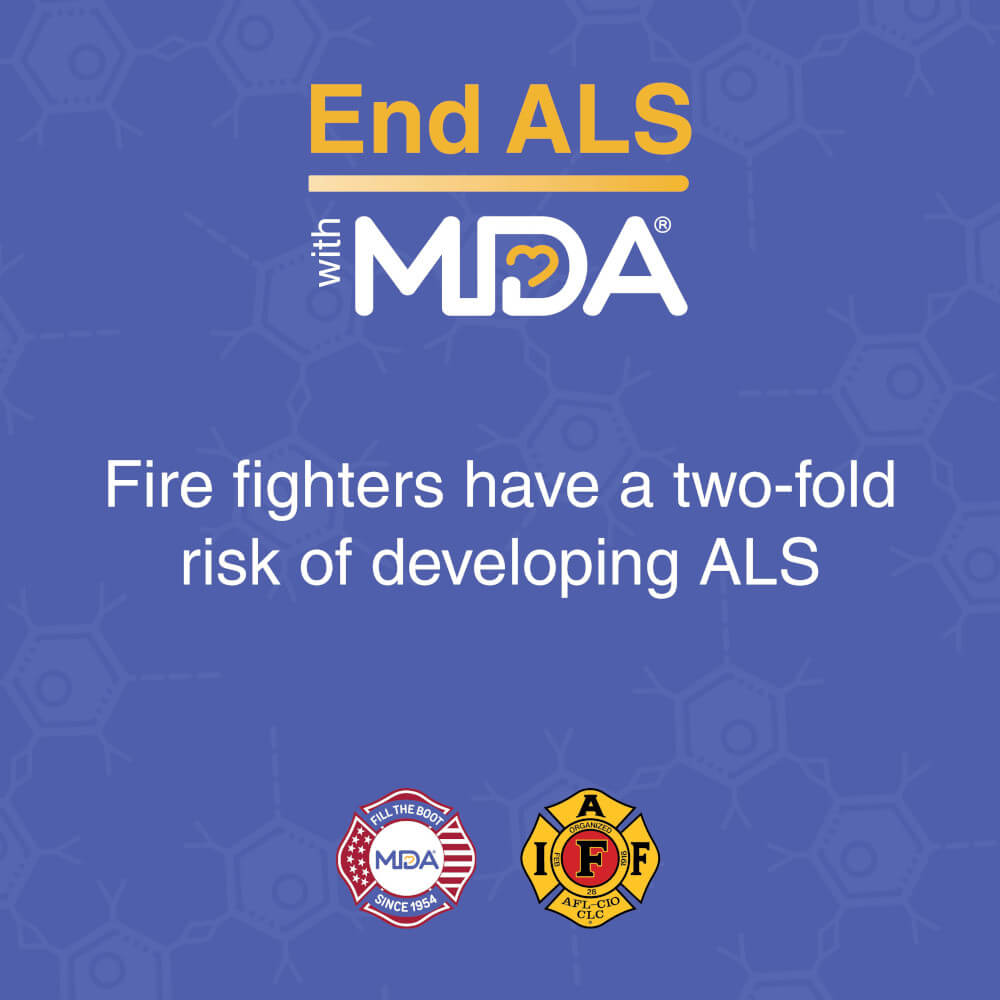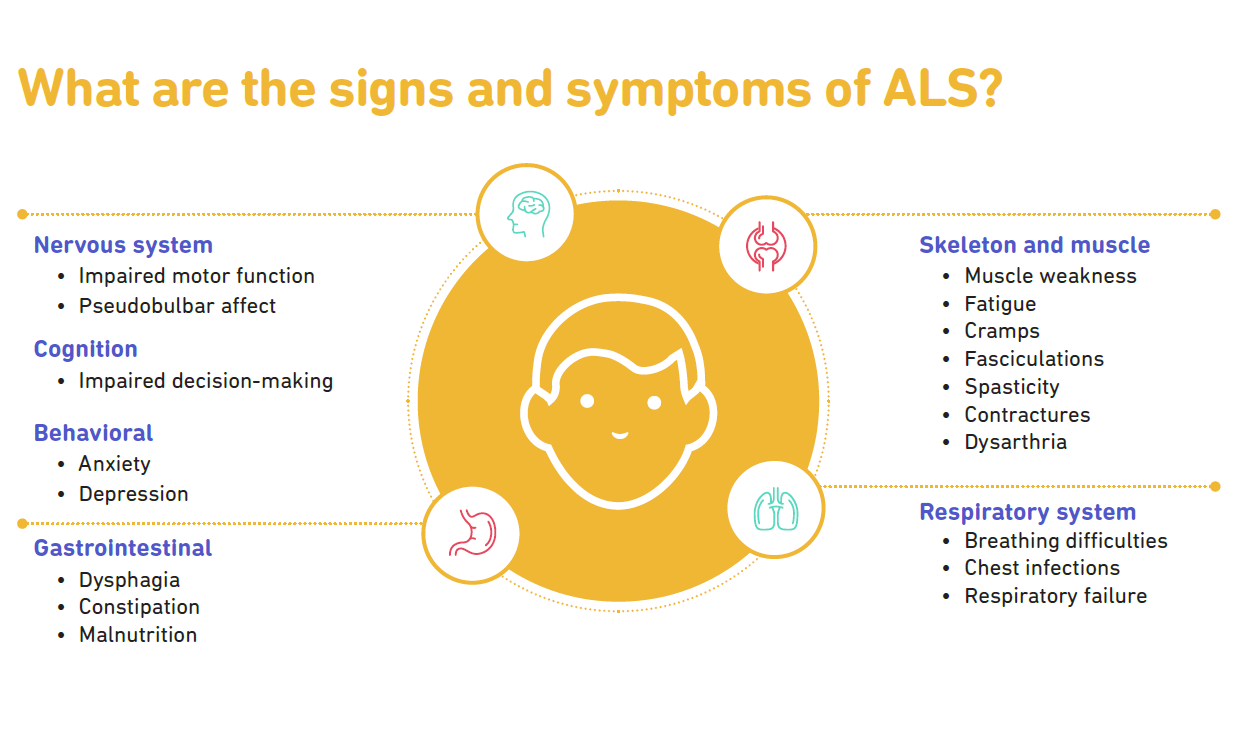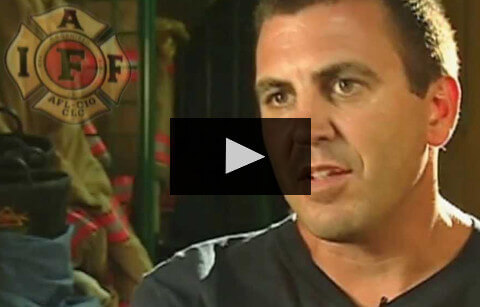ALS Resources for Fire Fighters
Muscular Dystrophy Association (MDA) and the International Association of Fire Fighters (IAFF) have joined together to coordinate an educational initiative to raise awareness and provide resources for fire fighters impacted by amyotrophic lateral sclerosis (ALS), also known as Lou Gehrig’s disease. Some research shows that fire fighters have a two-fold risk of ALS as compared to the general population. This initiative will provide critical resources to support fire fighters and their families who are living with ALS.

Play Video
MDA’s Commitment to ALS
MDA has been committed to ALS research and the ALS community since 1959 when Eleanor Gehrig, wife of the late baseball player Lou Gehrig, was our national campaign chair. Since then, MDA has been at the forefront of ALS research, care, advocacy, and support.
Most recently, the Muscular Dystrophy Association was among one of three leading ALS organizations to advocate for the ACT for ALS bill, which President Biden signed into law in December 2021.
To learn more about MDA’s impact in ALS, check out our impact sheet.
Symptoms & Diagnosis
What are the signs and symptoms of ALS?
For many individuals the first sign of ALS may appear in a hand or arm, as they have trouble with simple tasks such as buttoning a shirt, writing, or turning a key in a lock. In other cases, symptoms initially affect one of the legs, and people experience awkwardness when walking or running or they notice that they are tripping or stumbling a lot.

For additional signs and symptoms, please visit our website or download our ALS Fact Sheet.
How is ALS diagnosed?
There is no test that can provide a definitive ALS diagnosis. Diagnosis is based on a detailed history of symptoms and signs observed by a physician during physical examination, along with a series of tests meant to rule out other diseases that can mimic ALS.
Read more about the diagnosis process.
Genetic Testing: About 5 to 10 percent of ALS is familial — meaning it arises in families in which there is a history of ALS. Several genes associated with ALS have been identified or at least mapped to a specific region of a chromosome. The other 90 to 95 percent of ALS is sporadic, meaning it occurs without a family history (in other words, "sporadically"). There appear to be genetic variations that influence one's susceptibility to sporadic ALS, even if they do not necessarily cause the disease by themselves.
- Read more about genetic influences on ALS
- Download this overview of Genetics and Neuromuscular Disease
- Talk to your healthcare provider to learn more about genetic testing options. You can also reach out to our Resource Center.
Finding Care
Where can I, or my loved one, go for care?
MDA Care Centers provide expert, multidisciplinary care for individuals living with ALS. Located at more than 150 of the country’s leading hospitals and health care institutions, our Care Centers serve as the nexus for expert clinical care and medical research. Our MDA/ALS Care Centers demonstrate expertise in the treatment of ALS, providing the most comprehensive care available.
- Find an MDA Care Center near you
- Meet the MDA Care Center Team
- Preparing for Your Visit
- Diagnosis Management Toolkit – Make tracking your appointments, medical information, and therapeutic needs simple with this electronic binder.
How is ALS treated?
Currently, there is no cure for ALS and no effective treatment to completely halt or reverse the progression of the disease. However, there are currently two treatments approved by the FDA that may slow the disease course, help control symptoms, prevent unnecessary complications, and make living with the disease easier. These treatments include:
- riluzole (brand names: Rilutek, Exservan, Tiglutik)
- edavarone (brand name: Radicava)
In some cases, both drugs have been prescribed to patients.
Take our MDA Access to Approved Therapies Workshop to learn more about FDA-approved treatments for ALS. (Coming soon!)
Rilutex (riluzole)
Oral tablet form of riluzole FDA-approved in 1995 The first drug available to treat ALS Acts to slow the progression of ALS symptoms.
Exservan (riluzole)
Oral film form of riluzole FDA-approved in 2019. Dissolves automatically by placing on the tongue. Does not require water making it an option for those who have difficulty swallowing. Acts to slow the progression of ALS symptoms. Talk with an ALS JourneyMate specialist for support and resources.
Tiglutek (riluzole)
Oral liquid form of riluzole FDA-approved in 2018. Thickened liquid to help individuals with swallowing difficulties. Can flow through feeding tubes. Acts to slow the progression of ALS symptoms. Visit tiglutik.com to learn more.
Radicava (edaravone)
Intravenous infusion FDA-approved in 2017. Administered through a needle in a vein at an infusion center, doctor’s office, hospital, or at home by a healthcare professional. Found to slow the decline in daily, physical function. Searchlight Support can help provide access to Radicava as well as resources to have you navigate the options available.
Be sure to tell your care team about all the medications you currently take, including prescription and over-the-counter medicines, vitamins, and herbal supplements. As with all treatments, it is important to speak with your healthcare provider about whether or not these treatments are right for you.
In addition to these FDA-approved treatments, medical interventions and technology have vastly improved the quality of life for people with ALS by assisting with breathing, nutrition, mobility, and communication. Proper management of symptoms and proactive use of medical interventions and equipment can make a positive difference in day-to-day living, and potentially may lengthen life.
- Read more about the medical management of ALS
- Download the MDA ALS Fact Sheet
- Read about Maintaining Pulmonary Function with ALS
- Learn more about research currently being conducted in ALS
Clinical Trials
There are also many promising treatments in the pipeline, including two drugs awaiting FDA-approval in 2022 – AMX0035 and the oral form of edaravone.
Below are a few additional studies of note:
- CNM-Au8 Shows Survival Benefit for Patients With ALS in Phase 2 Extension (neurologylive.com)
- HEALEY ALS Platform Trial - Regimen C CNM-Au8 - Full Text View - ClinicalTrials.gov
- HEALEY ALS Platform Trial - Regimen A Zilucoplan - Full Text View - ClinicalTrials.gov
- HEALEY ALS Platform Trial - Regimen B Verdiperstat - Full Text View - ClinicalTrials.gov
- HEALEY ALS Platform Trial - Regimen D Pridopidine - Full Text View - ClinicalTrials.gov
- HEALEY ALS Platform Trial - Regimen E SLS-005 - Trehalose - Full Text View - ClinicalTrials.gov
- A Pilot Trial of Triheptanoin for People With Amyotrophic Lateral Sclerosis (PALS) - Full Text View - ClinicalTrials.gov
*Information updated as of April 2022.
Clinical trials play a key role in the discovery and development of new treatments for ALS. Find clinical trials you, or your loved one, might be eligible for by using our Clinical Trial Finder Tool.
Join the MDA Community
Next Steps in the Journey
Everyone’s journey with ALS is different. MDA is here to provide support and resources every step of the way. That is why we encourage newly diagnosed individuals to join the MDA community. By joining, you will receive the latest updates on research and clinical trials, gain access to impactful programming, and have opportunities to connect with the ALS community, including individuals, family members, clinicians, researchers, and advocates.
Join the MDA CommunityThe links on the left provide information on a variety of resources. You can also view the community resource list on our website.
If you cannot find the information or resources you are looking for, please reach out to our National Resource Center Monday through Friday 9 a.m. - 5 p.m. CT at (800) 572-1717 or by email at ResourceCenter@mdausa.org.
If you would like to connect directly with a member of the MDA Fire Fighter Partnership team, please email us at filltheboot@mdausa.org.
Advocacy, Research, & Education
Advocacy
MDA was among one of three leading ALS organizations to advocate for the ACT for ALS bill, which President Biden signed into law in December 2021.
- ACT for ALS will create a new grant program that funds access to investigational ALS treatments for people living with ALS who cannot participate in clinical trials, while also supporting research on treatment safety and ALS progression.
- ACT for ALS will invest in neurodegenerative disease research through a brand-new Food and Drug Administration (FDA) Rare Neurodegenerative Disease Grant Program.
- ACT for ALS will establish a Health and Human Services (HHS) Public-Private Partnership for Rare Neurodegenerative Diseases jointly led by the FDA and the National Institutes of Health (NIH), the first federal entity explicitly charged with the responsibility to speed the development and approval of therapies for rare neurodegenerative diseases.
To learn more about the ACT for ALS bill, watch our Advocacy Institute Webinar.
Research
Intense research is being conducted in many areas related to ALS, from basic science seeking the roots of the disease to therapy development to find effective treatments. To learn more, visit the links below:
- ALS Research Targets and Strategies Overview
- Watch our May 2021 MDA Facebook Live “ALS Care & Research Updates” to learn more about the status of ALS research.
- MDA MOVR Data Hub: MOVR captures robust clinical data from MDA’s Care Center Network. Through MOVR, MDA will accelerate the development of new treatments and improve the health outcomes for patients with neuromuscular disease, including ALS.
- Meet our MDA-supported ALS researchers
- Join The National ALS Registry
- Participate in a Clinical Trial
Community Education
MDA offers free virtual education programming throughout the year featuring presentations from top experts in the field on a variety of topics relevant to the ALS community.
- View recordings of presentations given at the 2021 MDA Engage ALS Symposium
- View recordings of presentations given at the 2020 MDA Engage ALS Symposium
- Register for upcoming Community Education programming
- Quest MDA’s Adaptive Lifestyle Content Platform offers stories that explore independence and well-being, conversations with thought leaders, and updates on research and clinical trials. Check out Quest magazine, blog, newsletter, and podcast.
Medical Equipment & Navigating Insurance
Watch these informative webinars:
- MDA Engage: Medical Equipment and Assistive Devices Part One
- MDA Engage: Medical Equipment and Assistive Devices Part Two
- Listen to this Quest Podcast on "Access to the World: Accessibility in Our Homes".
Navigating Insurance Coverage
- MDA Access Workshop: Insurance Another on-demand workshop that allows you to navigate at through the information at your own pace. It provides an overview of the types of health insurance, obtaining and understanding insurance coverage, and overcoming barriers to coverage.
- Health Insurance Worksheet
Social and Emotional Support
- MDA National Connections Program
MDA’s National Connections Program helps members of the neuromuscular disease community build bonds with one another by connecting people to other individuals living with a neuromuscular disease, caregivers, parents, spouses, or siblings. For more information or to get connected, please email ResourceCenter@mdausa.org. - Watch this MDA Engage webinar "Mental Health and ALS"
- Watch our MDA Facebook Live "Mental Health for the Neuromuscular Disease Community"
- Read and share this handout on "Neuromuscular Disease and Your Mental Health"
- Check out our MDA Mental Health Hub
Support for Caregivers
- Read our MDA Guide for Caregivers
- Watch our MDA Engage Caregivers Seminar
- Watch our MDA Engage Caring for the Caregiver
- Listen to these Quest Podcasts: "Love and Marriage" and "Siblings Tell All"
Personal Stories of Individuals Living with ALS
Sometimes what helps the most is knowing you are not alone. Click on the links below to read and listen to personal stories from the ALS community. If you are interested in sharing your story, please reach out to us at resourcecenter@mdausa.org.
- Do You Know ALS? Meet Sunny.
- Do You Know ALS? Meet Sandy.
- Do You Know ALS? Meet Ed.
- With ALS, Ryan Farnsworth Leans on Optimism, Creativity and Hope
- Keeping a Sense of Humor
Meet Shaun Probert
Former Member of Local 516 talks about his journey living with ALS.

To hear more of Shaun’s story, please watch his presentation to IAFF members at the 2012 IAFF Convention.